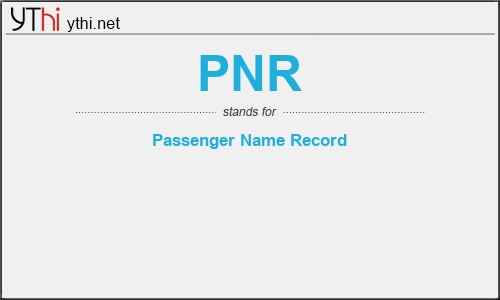What does PNR mean? What is the full form of PNR?
The full form of PNR is Passenger Name Record.
U.S. law requires air carriers operating flights to, from, or through the United States to provide the Department of Homeland Security (DHS), U.S. Customs and Border Protection (CBP), with certain passenger reservation information, called Passenger Name Record (PNR) data. This information is transmitted to CBP prior to departure and used primarily for purposes of preventing, detecting, investigating, and prosecuting terrorist offenses and related crimes and certain other crimes that are transnational in nature.
Collection of PNR information from air carriers is authorized by 49 U.S.C. § 44909(c)(3) and its implementing regulations at 19 C.F.R. § 122.49d. These statutory and regulatory authorities require each air carrier operating passenger flights in foreign air transportation to, from, or through the United States to provide CBP with electronic access to PNR data to the extent it is collected and contained in the air carrier’s reservation and/or departure control systems. The European Union (EU) has determined that U.S. laws, in conjunction with CBP policies regarding the protection of personal data, provide an adequate basis upon which to permit transfers of PNR data to the United States consistent with applicable EU law. An updated U.S.-EU PNR Agreement was signed in December 2011.
The Privacy Act of 1974, as amended (5 U.S.C. § 552a), governs the maintenance of information in federal agency systems through which records are retrieved using the personally identifiable information (PII) of United States citizens and lawful permanent residents. The Privacy Act regulates how the government can disclose, share, provide access to, and maintain the personal information that it collects in such systems. Though the Privacy Act does not afford coverage to non-U.S. persons, the Judicial Redress Act of 2015 (5 U.S.C. § 552a note), also extends provisions of the Privacy Act to non-U.S. citizens and non-lawful permanent residents who are citizens of countries that have been designated pursuant to procedures identified within the Judicial Redress Act. For those covered by neither, DHS policy covers information for all persons, regardless of immigration status, and treated consistent with the Fair Information Practice Principles (FIPPs).
DHS allows all persons, including foreign nationals, to seek access and request amendment to certain information maintained in the Automated Targeting System (ATS), including PNR data. Please see the procedures provided below. However, certain information maintained in ATS, such as information pertaining to the rule sets or accounting of a sharing with a law enforcement or intelligence entity in conformance with a routine use, may not be accessed, pursuant to 5 U.S.C. §§ 552a (j)(2) or (k)(2). For additional information, please refer to the ATS System of Records Notice (SORN) and Privacy Impact Assessment.
The Passenger Name Record (PNR) Agreement between the United States and the European Union (EU) makes possible the transfer of certain passenger data to Customs and Border Protection (CBP) in order to facilitate safe and efficient travel. The documents below demonstrate the progression of the Agreement since its inception and include subsequent reviews conducted by both the United States and the EU to ensure compliance with the Agreement.
PNR
means
Passenger Name Record![]()
Translate Passenger Name Record to other language.


Leave a Reply
You must be logged in to post a comment.